However, according to the Tax Department, in addition to not fully understanding tax policies and the subjects applying electronic invoices, the reason why small traders closed their doors was due to the fear of being inspected and punished for storing and trading goods of unknown origin and poor quality goods...
The Hanoi City Market Management Department inspected a batch of perfume with signs of counterfeiting brands at a business establishment on Hang Giay Street (Hoan Kiem District).
Sales at a standstill
Market surveys in recent days show that there is a phenomenon of some households and individuals selling fabrics, clothes, hats, candies, personal items... closing down or selling at a limited scale at markets: Ninh Hiep, Dong Xuan, Long Bien, La Phu..., or some commercial streets: Hang Ngang, Hang Dao... Some opinions say that the above phenomenon is caused by the implementation of Decree No. 70/2025/ND-CP. However, this issue is not understood correctly.
According to the tax management database, there are currently 37,576 business households nationwide that are required to implement electronic invoices from cash registers, equivalent to about 1% of the total of more than 3.6 million business households. In fact, many small businesses, even those not subject to adjustment, have temporarily suspended business. According to data from the Tax Department of Region I, currently in the area
Hanoi, the Tax Administration Department manages over 311,000 business households and individuals. Of which, the number of business households and individuals with revenue of 1 billion VND or more that are required to use electronic invoices generated from cash registers is 4,979 households and individuals; accounting for only 1.6% of the number of managed households.
As of June 11, 2025, 4,379 households and individuals in the target group have registered to use electronic invoices generated from cash registers. In addition, 4,551 households that are not yet eligible have voluntarily registered to use electronic invoices generated from cash registers. Thus, the total number of registered households has reached nearly 9,000, exceeding the assigned target by 180.1%.
Furthermore, the Tax Department of Region I said that, based on the tax authority's monitoring records, the number of business households that stopped or ceased operations in the two months of May and June was 2,961, of which the number of households that had to use invoices was only 263 (8.8% of the number of households that stopped operations, accounting for 5% of the number of households that had to apply electronic invoices generated from cash registers). Traditional and people's markets basically operated normally, with no major business suspensions. The tax policy for business households that implemented electronic invoices generated from cash registers remained unchanged.
Not a tax policy issue
In fact, many businesses are still operating normally. Ms. Trieu Thi Loc - owner of a large grocery store in Thanh Xuan district said that since the regulation on applying electronic invoices generated from cash registers for households and individuals with revenue of over 1 billion VND took effect, the store is still operating normally as before. The goods at the store all have clear origins. Moreover, tax officials have given her detailed advice on electronic invoices, so she is not worried.
The fact that many businesses simultaneously stopped selling coincided with the time when the authorities launched inspections and handled violations of smuggling, trade fraud and counterfeit goods under the direction of the Prime Minister. Some experts believe that the temporary suspension of small businesses is mostly not due to changes in tax policies but due to concerns, misunderstandings and market pressure. Thus, it can be seen that the reason why many households and individuals stopped selling is mainly due to the fear of being held accountable for trading in counterfeit goods, not a tax policy issue. This was emphasized by General Secretary To Lam at a working session with the Standing Committee of the Hanoi Party Committee on June 16, 2025.
In addition, many business households are concerned about being charged additional tax for the previous period if the actual revenue using invoices is higher. Regarding this issue, a representative of the Tax Department of Region I said that the tax is determined based on data from the tax authority combined with the declaration of the business household. In case, during the year, if there is a revenue fluctuation exceeding 50% (increase or decrease), the business household can proactively request an adjustment of the tax rate. The adjustment is only calculated from the time of the fluctuation onwards.
At the question and answer session of the ninth session of the National Assembly, Minister of Finance Nguyen Van Thang affirmed that the recent implementation of tax policies coincided with the peak of the State's campaign against counterfeit, fake and poor quality goods. Therefore, the reason why stores closed was because of fear of being inspected, fined, and having their goods confiscated for not ensuring quality, not related to tax policies. There has been no change in tax policy, even more preferential treatment such as raising the tax exemption status of households, currently 100 million VND, the taxable status is 200 million VND or more.
From May 15 to June 15, the functional forces in the Steering Committee 389 of Hanoi city inspected 937 cases; handled 814 cases (including criminal prosecution of 7 cases against 16 defendants); imposed administrative fines of more than VND 14 billion; collected over VND 1.2 billion in back taxes; the value of infringing goods was nearly VND 39 billion.
Deputy Director of Hanoi Department of Industry and Trade Nguyen Kieu Oanh:
Ensuring the origin of goods is a way to protect business reputation.
As authorities tightened their controls, the subjects switched to using slang and communicating via unofficial messaging apps, making the investigation more complicated. Many people livestreamed in one place and sold goods in another, while the goods were hidden in private apartments or deep alleys, greatly hindering the inspection work.
Regarding the situation of some small traders in large markets closing to avoid inspection due to lack of input invoices, the authorities understand and share the difficulties of the people. However, trading goods without valid invoices and documents is considered a violation. Therefore, we hope that people understand that ensuring the origin of goods is not only a legal requirement but also a way to protect business reputation, consumer health and a healthy commercial environment.
Executive Director of the Faculty of Finance and Banking (Nguyen Trai University) Nguyen Quang Huy:
Need to deploy appropriate layers and roadmap
The application of electronic invoices to business households and individuals is not simply an administrative requirement, but a major shift in management thinking, revenue recognition and tax transparency. However, it is necessary to distinguish between fixed business households with locations and high revenue (gold shops, restaurants, large agents, etc.) and small retail, street vendors, or seasonal traders. For the first group, electronic invoices are feasible and should be implemented soon. For the latter group, the application mechanism needs to be flexible to avoid causing disruption or creating administrative burdens.
Additionally, free software and device support should be provided in the early stages, as this is a period of behavioral and mindset transformation, not just technological transformation.
Ms. Nguyen Thi Tham (business household in Trung Hoa ward, Cau Giay district):
There should be no penalties for mistakes in the early stages.
I do business and collect and pay in manual form. I hope that, in the process of applying electronic invoices in the initial stage, if there are any errors, the tax authorities should not punish but remind and support businesses to do better.
When applying electronic invoices, what many business households worry about is the risk of having to pay back the lump sum tax for the previous period, if the actual revenue when using the invoice is higher. I am very pleased when the Tax Department leader said that when the lump sum revenue changes by 50% or more, the business household must notify the tax authority of the change in the lump sum and will not be charged back.
Performed by Ngo Huong - Thanh Hien
Source: https://hanoimoi.vn/tang-cuong-kiem-tra-nguon-goc-hang-hoa-manh-tay-tran-ap-hang-gia-706434.html


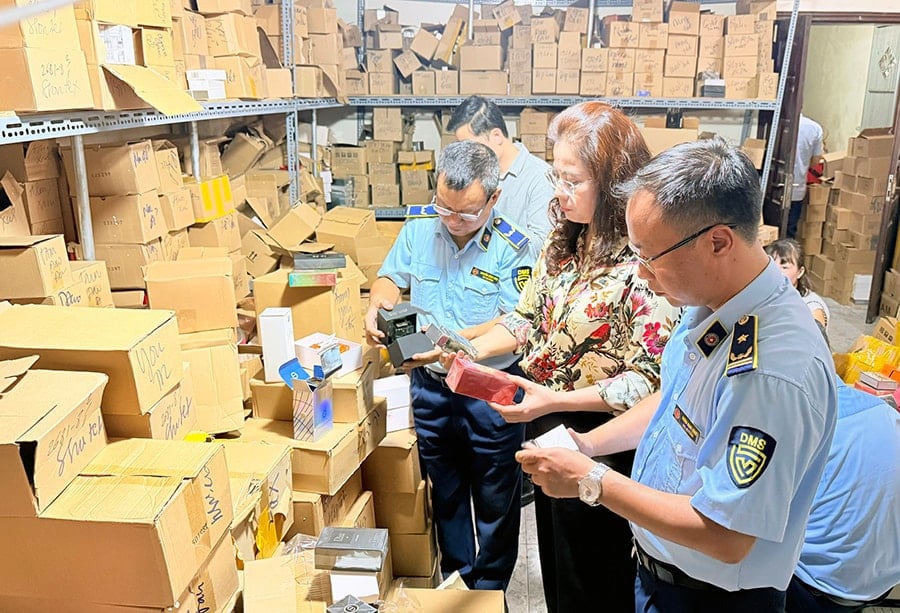


![[Photo] Special class in Tra Linh](https://vphoto.vietnam.vn/thumb/1200x675/vietnam/resource/IMAGE/2025/11/14/1763078485441_ndo_br_lop-hoc-7-jpg.webp)

![[Photo] Deep sea sand deposits, ancient wooden ship An Bang faces the risk of being buried again](https://vphoto.vietnam.vn/thumb/1200x675/vietnam/resource/IMAGE/2025/11/13/1763033175715_ndo_br_thuyen-1-jpg.webp)
















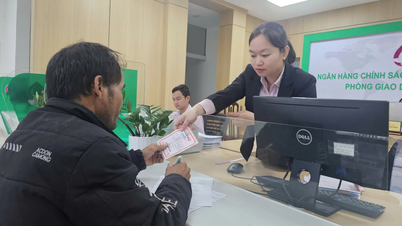

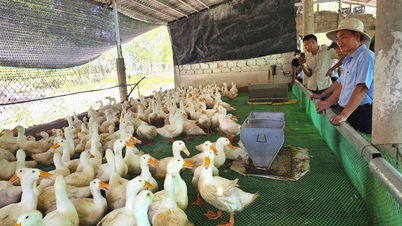











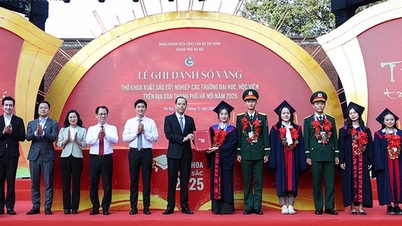

















































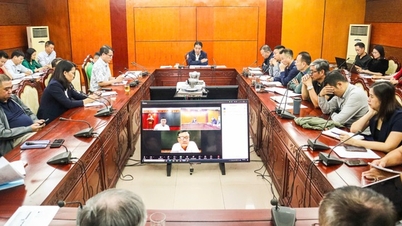


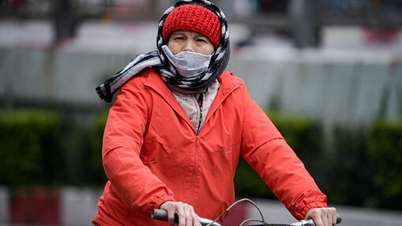




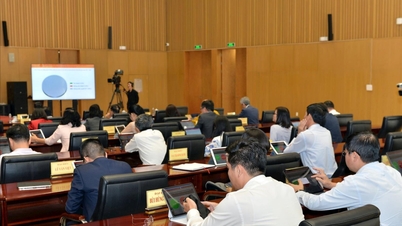

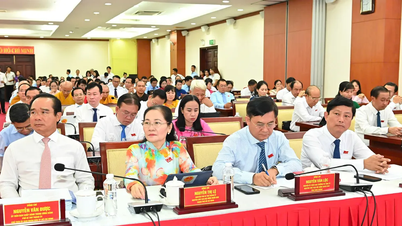







![Dong Nai OCOP transition: [Article 3] Linking tourism with OCOP product consumption](https://vphoto.vietnam.vn/thumb/402x226/vietnam/resource/IMAGE/2025/11/10/1762739199309_1324-2740-7_n-162543_981.jpeg)







Comment (0)